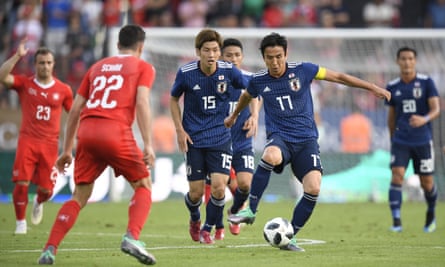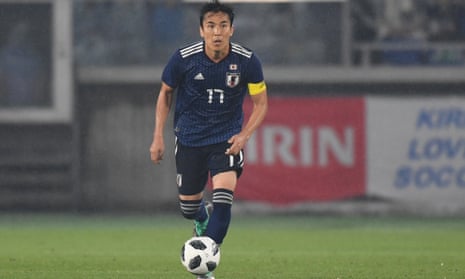This article is part of the Guardian’s 2018 World Cup Experts’ Network, a cooperation between some of the best media organisations from the 32 countries who have qualified for Russia. theguardian.com is running previews from two countries each day in the run-up to the tournament kicking off on 14 June.
Like many other Japanese players of his generation the national captain, Makoto Hasebe, started to dream of becoming a professional footballer when he read the popular and globally famous manga series Captain Tsubasa. Inspired by the miraculous skills of Tsubasa Oozora, the comic books’ eponymous star, Hasebe has been kicking a ball for as long as he can remember.
But there were also unique cultural factors behind Hasebe’s boyhood obsession with the game. In a country that has long been more associated with two other sports, baseball and sumo, his home town of Fujieda in Shizuoka Prefecture was highly unusual by Japanese standards due to its extraordinary passion for football instead. Despite Fujieda’s status as a small provincial city with a population of just over 100,000 people, it has produced a succession of renowned players including Hiroshi Nanami and Masashi Nakayama, who both represented Japan at the 1998 World Cup in France.
Growing up in such an environment Hasebe – who has starred in the Bundesliga for a decade now – was not rated all that highly before his late teens.
Partly thanks to the tutelage of his parents, Hasebe was a diligent schoolboy and, at 15, earned a place at Fujieda Higashi High School. This famous institution accepts only students of strong academic ability, but is also renowned for its highly successful football club who are perennial contenders at the nationally-televised All Japan High School Soccer Tournament each year. At first, Hasebe made little impression within the team and for some time struggled to even make the bench. Team-mates from the time recall that he spent more time during his first year quietly going about chores than actually playing; in particular, they say, he had a most steady arm when it came to marking the lines on the pitch.
It was only towards the end of his second season at Fujieda Higashi that he finally got his chance to make an impression with a football rather than just white paint. A late growth spurt helped him win a regular starting position and, slowly, the confidence of those around him. Even then, his reputation as a player was still only average at best; the future long-serving captain of the Japanese national team was never once seen as a candidate for the armband at his own high school.
However, as a third-year, Hasebe would show a dramatic and sustained improvement in his performances as an attacking midfielder. Around the turn of the millennium, major nationwide tournaments at under-18 level were held every summer, autumn, and winter. Hasebe performed superbly at both the summer and autumn tournaments to attract a surge of attention having been a total unknown just months earlier. Soon afterwards, he earned what would be the first of many call-ups to the Japanese age-level national teams.
The professional J-League clubs did not ignore these performances and it was Urawa Red Diamonds who pursued Hasebe’s signature most persistently. However, the 18-year-old’s parents remained keen that he should continue his education and argued that he should go to university rather than take the risk of turning professional at his age. Even his high school coach, despite such an upturn in performances, told him again: “There is no way you will make it in the professional leagues”.

The only one to offer different advice was another member of Hasebe’s family – his grandfather: “If you’re a man, you take the challenge.” It was his grandfather who had originally bestowed upon him the name Makoto – meaning “honesty” or “integrity” – and he continued to support his beloved grandson’s dreams of playing football for a living by persuading everyone else to put their objections aside. Ultimately, parents and teachers alike would bow to the strength of this ambition and allowed Hasebe to choose his own path.
Roughly a year after Hasebe signed his first professional contract, his grandfather fell ill and passed away. To Hasebe, still only 19, this came as a crushing blow but, at the same time, he discovered an ever more indefatigable desire to make a success of his career. Those who witnessed his second season with Urawa described him as a completely different person as a series of spirited performances led to a regular place in the starting XI for the first team. His development continued unabated towards, at last, captaincy material and his status today as one of the greats of Japanese football.
If Hasebe manages to score in Russia this summer, it would be no surprise to see him point upwards and shout to the heavens. This goal, of course, would be dedicated to the grandfather who has inspired him throughout everything.
Akihiko Kawabata writes for Footballista.
English translation and additional text by Ben Mabley

Comments (…)
Sign in or create your Guardian account to join the discussion